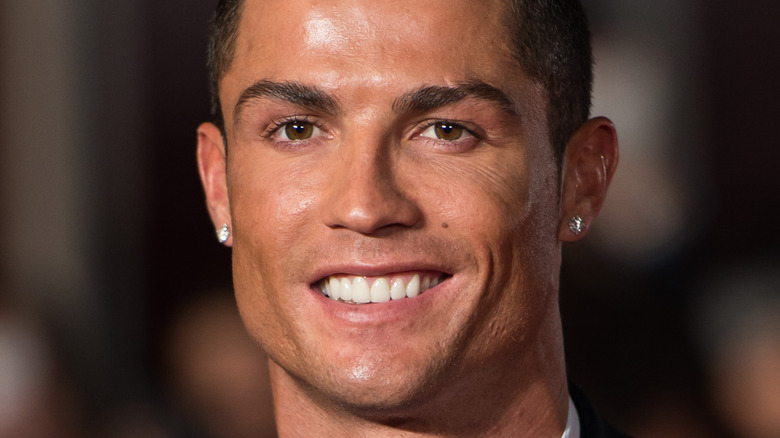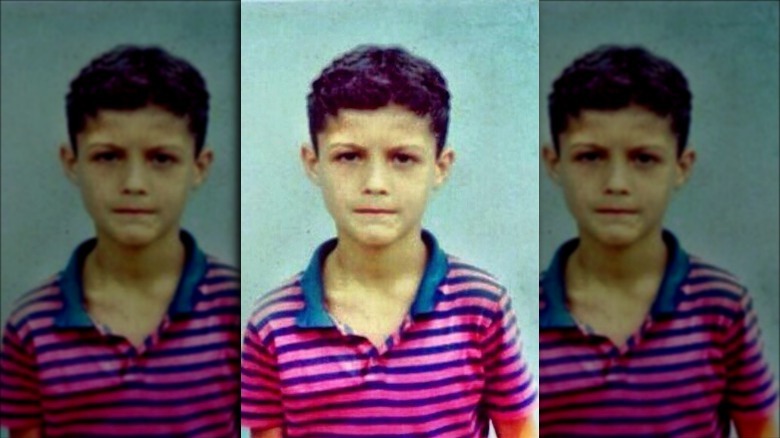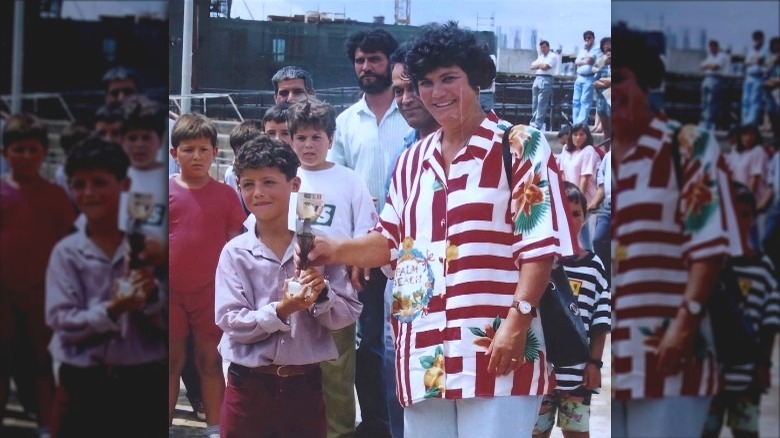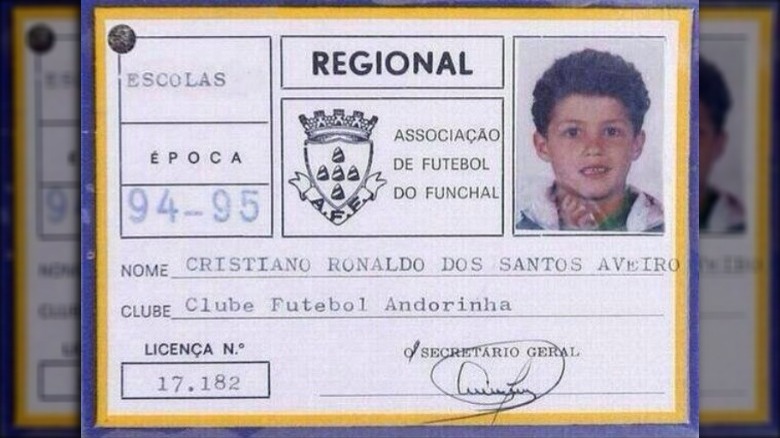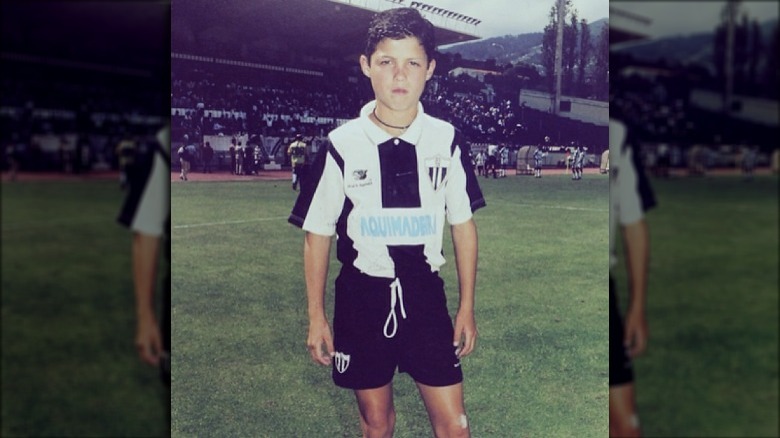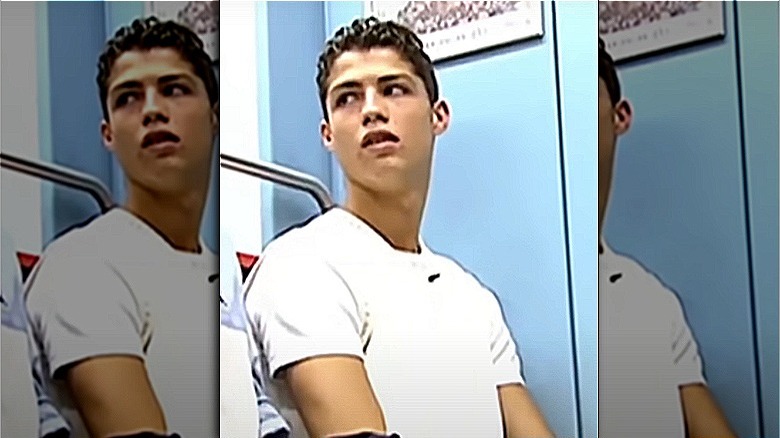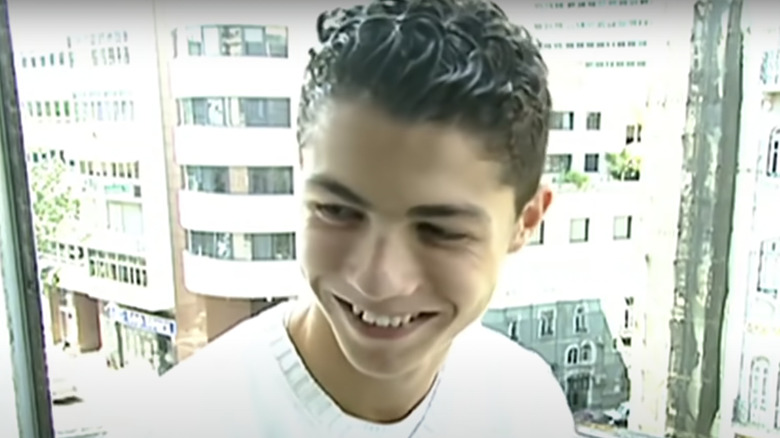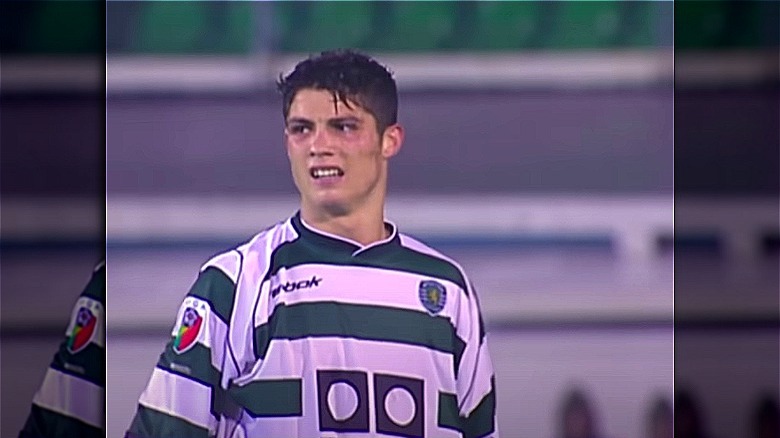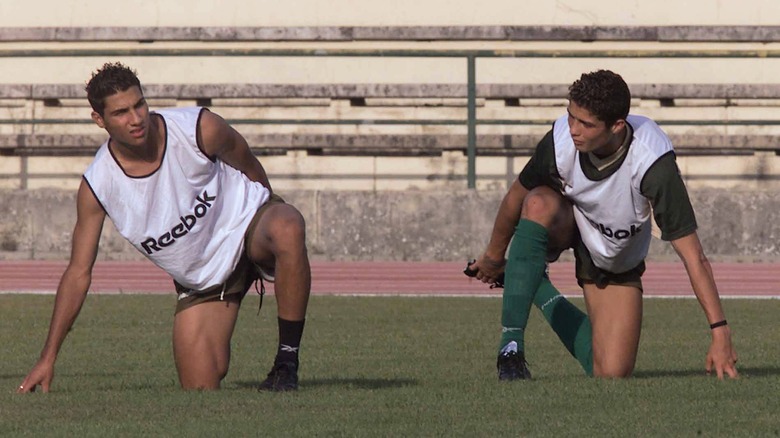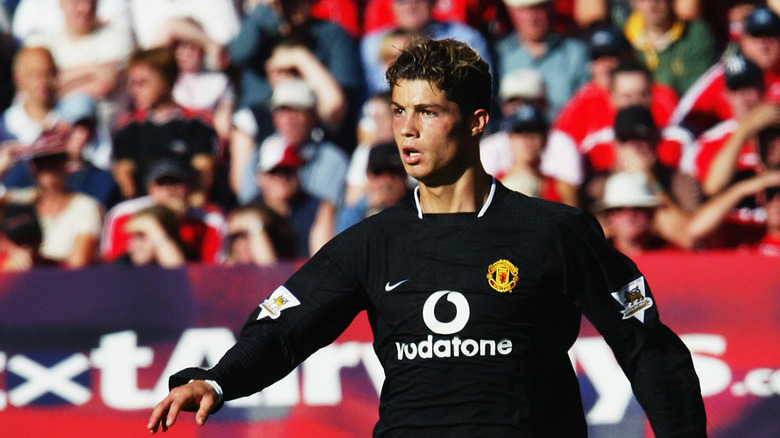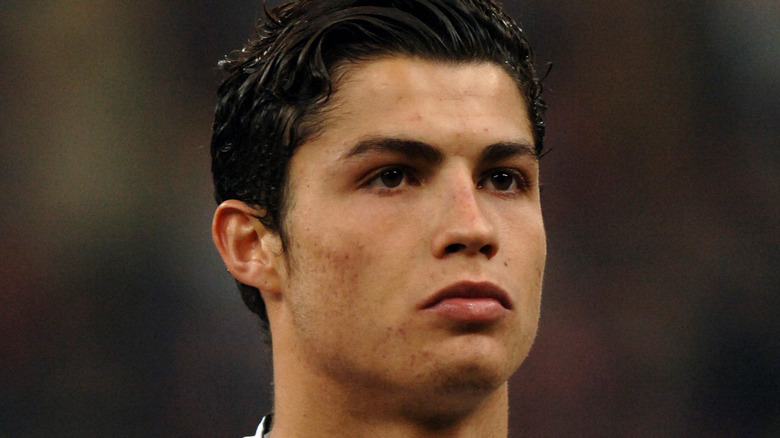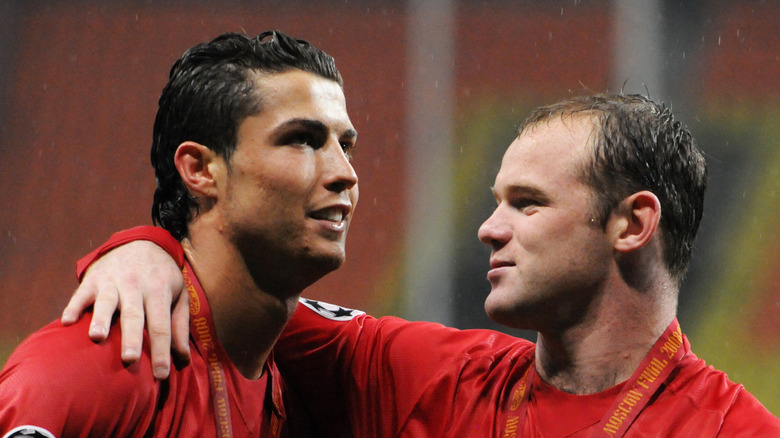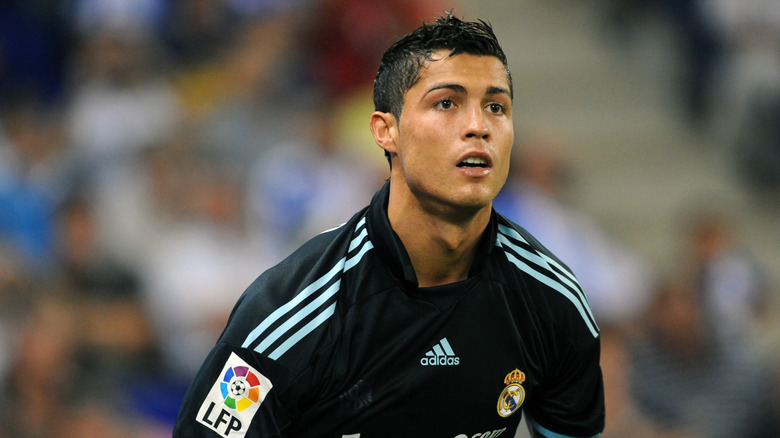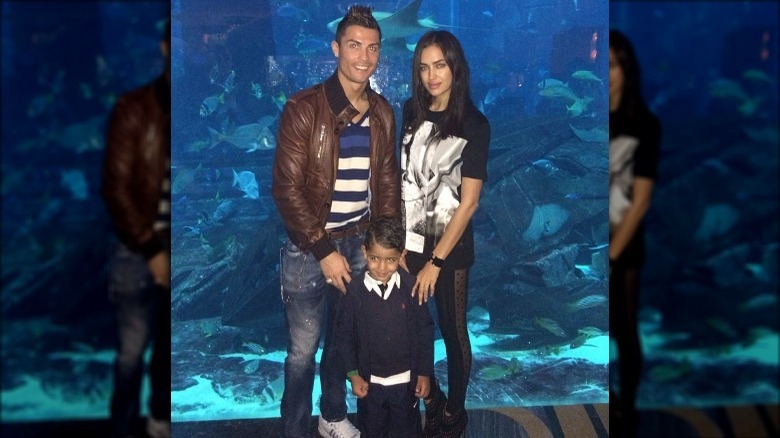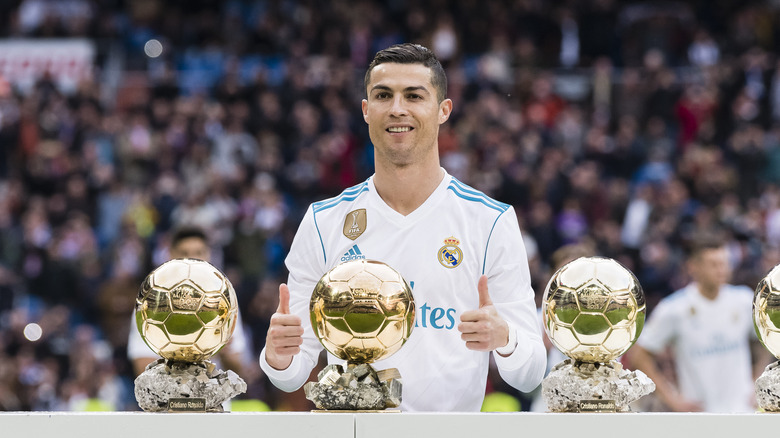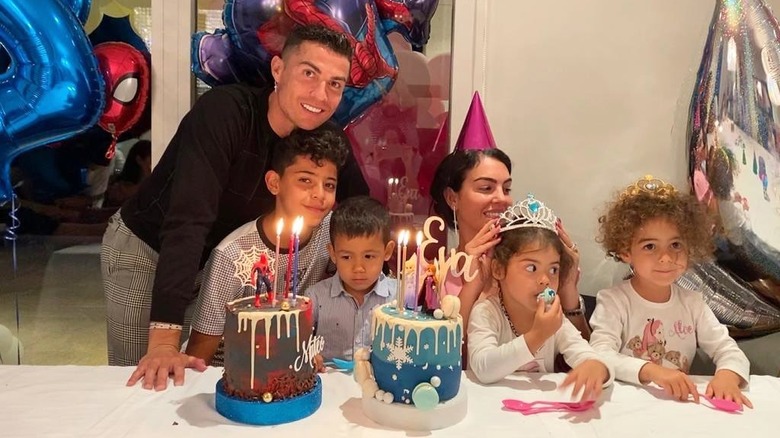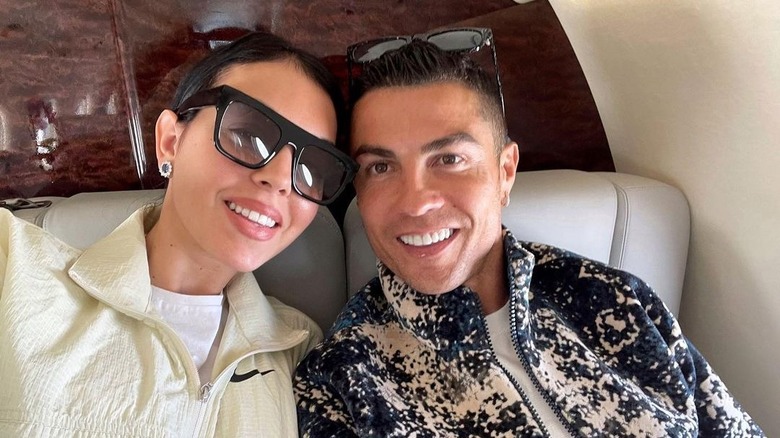The Transformation Of Cristiano Ronaldo From Childhood To 36
Cristiano Ronaldo is one of the biggest names in soccer — ever. He revolutionized the sport in Portugal, which had seen a handful of successful players before but that has seen a boom in talent since Ronaldo inspired young boys on every corner. On the heels of Cristiano's decade-plus dominance, a new generation of Portuguese players are enchanting soccer fans in the big leagues, including the coveted Premier League of England and Spain's La Liga.
A boy of humble beginnings from the archipelago of Madeira, Ronaldo rose to fame quickly and worked hard to cement his name in the history of the world's most popular sport. He has won five Champions League titles with Real Madrid and Manchester United, and has been recognized as the world's best player a whopping total of five times, as Football Transfers listed. Throughout his career, Ronaldo has adapted his style of play when needed to remain at the top. "To maintain this level, you need to make sacrifices," he told the Mirror. At 36, he continues bringing in the titles and records.
But Ronaldo's grip reaches way beyond the world of soccer. He's a global superstar, one of 2020's highest-paid celebrities, and a massive social media following that keeps fattening his wallet: As Goal noted, the star reportedly makes more than £310,000 per sponsored post.
Ronaldo has already given us a lot and promises to give us more. Keep scrolling to check out his transformation from a lanky boy to one of the best players in soccer history.
Cristiano Ronaldo hails from a poor community in Portugal's Madeira
Cristiano Ronaldo dos Santos Aveiro was born in one of the poorest neighborhoods of Funchal, the capital of Madeira, an autonomous Portuguese archipelago in the Atlantic off the coast of Africa. His mother, Dolores Aveiro, was a cook and his father, José Dinis Aveiro, a gardener for the city, according to Goal. In light of various hardships the family faced before Ronaldo was born, Dolores considered interrupting the pregnancy, but as she said in the 2015 documentary "Ronaldo" (via Mirror), her Catholic faith prevented her from going through with it.
The neighborhood of Santo António looks vastly different today from when Ronaldo walked on its dirt roads in the late 1980s. Ever-changing but always humble, Santo António and its inhabitants hold onto Ronaldo as a symbol of hope, as Portugal's Diário de Notícias pointed out. "People forget that he is a kid with boundless will and grit, but he grew up too fast. His freedom of movement was brought to him by life's imposition," Ramiro, a childhood friend, told the publication in 2009.
Ronaldo and his three siblings shared a room growing up, and he is fond of his early childhood. "I'm incredibly close with my brother and sisters and we loved being together. For us it was normal, it was all we knew. Everyone around us lived the same way and we were happy," he told the Mirror.
Cristiano Ronaldo was named a U.S. president
José Dinis Aveiro loved American movies, and his favorite actor was Ronald Reagan, the star of classics such as "Dark Victory" and "Dark Row." Dinis's admiration of the Hollywood star only heightened when he ran and won the presidency of the United States in 1980, per One Football. Dolores and Dinis Aveiro's fourth child was born on February 5, 1985, two weeks after Reagan's second inauguration. The couple had their minds made up and gave their newborn a second given name inspired by the president's first name, he told GQ in a 2016 interview. "My parents named me after him because they both liked this name and thought it sounded strong. I know that my father admired him," Ronaldo said.
Ronaldo's name became official at his baptism, though the ceremony almost didn't take place — a rather serious matter among Catholics. As was recounted to Goal, Dinis asked his friend Fernão Barros Sousa, a soccer player for the local CF Andorinha, to be Ronaldo's godfather at the baptism, commonly celebrated shortly after birth in the Catholic tradition. "That day, Andorinha were playing in Ribera Brava, so I was going there, Dinis as well, and we arrived much later at the baptism, so late that the priest didn't want to baptise him! We had to convince the priest to baptise him and that's what happened. It's a funny thing, it was all ready to start and we weren't there. It wasn't good!" Sousa said.
Cristiano Ronaldo's father also worked as a kitman for a local soccer club
José Dinis Aveiro's other gig would change his family's life forever. As Goal recounted, Cristiano Ronaldo's dad also happened to work as a kitman for CF Andorinha, the soccer team of Santo António in Funchal, and the young future sports star often tagged along. It was at Andorinha that Aveiro befriended player Fernão Barros Sousa, who was captain of the team at the time. "He had the bags with the footballs and Cristiano would be with his father, with a ball in hand and playing with the ball. He tried to dribble and obviously he copied the older players. He did that a lot," Sousa recalled.
Sousa's influence proved vital on the young boy. After growing up watching his godfather play, Ronaldo himself started playing for Andorinhas in 1992, when he was just seven years old. Even at that age, Ronaldo's abilities were obvious, and as former teammate Ricardo Santos said in Goal, he went by "abelhinha," which is Portuguese for little bee. "[H]e was small and he was very quick, so we called him 'abelhinha,'" Santos told the outlet.
Soccer consumed most of Ronaldo's time. He even neglected school work to play, Sousa recalled. Rui, a groundsman for the club at the time, also remembers Ronaldo's fixation. "It wasn't easy to get the ball off him. He was very small, but he was always playing football. He never stopped. He was always playing, at home as well," he shared with Goal.
Cristiano Ronaldo was a sensitive kid whose nickname was 'crybaby'
While Cristiano Ronaldo might have a reputation for being standoffish and arrogant, he wasn't always that way. As Ricardo Santos, a former teammate at CF Andorinha, told Goal, "What I remember about him is that he was a humble kid. And when he didn't have the ball, he cried. When the team-mates fought, he cried... Cristiano really liked winning. When that didn't happen, Ronaldo cried. So much so that he had the nickname 'crybaby.'"
That's also how Marques de Freitas, Madeira's former deputy attorney general, remembers him. "Contrary to what many people here in Madeira think, Cristiano Ronaldo is not a vain individual. He is modest and extremely shy," he said to Portugal's Diário de Notícias. That's why when he goes back to Madeira, he mainly stays in the hotel, Freitas said. He is proud of his roots and close to his family, who still lives on the island, as GQ noted. But when visits, he stays out of sight as much as possible. "He avoids multitudes," Freitas told the publication.
Ronaldo isn't afraid of the sensitive side in himself, he admitted on Spain's Punto Pelota (via Bleacher Report). "I have many tears left... it's good to cry... I have cried a lot. People that know me or work with me know," he said.
Cristiano Ronaldo's godfather helped him transfer to Madeira's largest club
After showing off his skills at CF Andorinha, a neighborhood team, 10-year-old Cristiano Ronaldo went to CD Nacional, one of Madeira's two big teams, with the help of his godfather, Fernão Barros Sousa, per Diário de Notícias. As Sousa explained to the outlet, Nacional owed money to Lisbon's Sporting CP, one of Portugal's main teams, and the latter "forgave the debt in exchange for Ronaldo." The team signed him for a fee of about $2,000. And so, at 11 years old, Ronaldo left Madeira and moved to the country's capital city, more than 600 miles from home. He shared a hostel room with Miguel Paixão, who went on to become Cristiano's lifelong friend, per The Sun.
His family didn't have much money, and scraping enough for three meals was often a challenge, he told Piers Morgan in 2019. After practice, he would sometimes stop by the McDonald's close to the stadium to ask whether they had any leftover hamburgers. He remembered three employees who helped him out during that time.
"They were unbelievable," Ronaldo said, noting that he wanted to find them and thank them personally, but he was unable to track them down. "I want to find these girls," he shared. "To give something back because that period I appreciate so much. I never forgot that moment."
Cristiano Ronaldo dropped out of school at 14 to focus on his soccer career
After playing for the Sporting youth football academy for two years, Cristiano Ronaldo felt ready to play semi-professionally, he told the Mirror in 2014. While his dribbling skills and speed were impressing many, his abilities at school were not, even though he was popular among students. "I was not thick but I was not interested in school. I was expelled after I threw a chair at the teacher. Why? He disrespected me," Ronaldo said.
He didn't want to look for another school at that point. He pleaded his case with his mother, Dolores Aveiro, who agreed that he should interrupt his studies to focus exclusively on his soccer career, according to the Mirror. Aveiro worried about her son's behavior at school and considered that soccer would likely open more doors for her son in the future, the report detailed. When the interviewer asked him what he would've ended up doing for a living had soccer not worked out, he said, "I don't know... a waiter?"
In Lisbon, he wasn't seen as the handsome, popular boy he had been in Madeira. Per the Manchester Evening News, local boys made fun of Ronaldo for his island accent and Ronaldo couldn't help but miss home and his family. So Aveiro began to fly into town more often to help her son settle in. His mother remains his rock to this day.
Cristiano Ronaldo underwent heart surgery at 15 while playing at Sporting
When he was 15, Cristiano Ronaldo was diagnosed with having an irregular heartbeat, which could have prevented him from playing. "His heart raced a lot when he wasn't running," his mother, Dolores Aveiro, told the Daily Mail, adding, "Before we knew exactly what he had, I was worried because there was the possibility of him giving up playing [soccer]. Sporting's medical team performed a series of thorough examinations and decided that the best course of action was for him to undergo heart surgery. "The people in charge at Sporting alerted me and I went to Portugal where I had to sign some papers and authorise him being treated in hospital," she said, according to The Telegraph.
Doctors cauterized the area with a laser, she explained. "[T]he treatment went well and after some days he was back at training again. Cristiano wasn't very worried — he didn't take the situation very seriously — but I got a big fright. It seems the treatment allowed him to run even faster!" Aveiro said according to the Daily Mail.
After the procedure, Ronaldo never developed any side effects or had any relapse that could have brought into question the strength of his formidable health, according to Sportskeeda. In fact, he went on to become one of the most athletic names in the sport's history, Goal pointed out.
Cristiano Ronaldo made history at Sporting
When Cristiano Ronaldo arrived at Sporting, he wasn't seen as the otherworldly talent that would bring glory to Portugal, a country passionate about soccer but that hadn't managed to shine as brightly as its neighbors. The promising star then was another teenager, just one year older than Ronaldo: Ricardo Quaresma (pictured here with Ronaldo in 2001), The Guardian noted. Quaresma came out of the club's youth ranks and was promoted for the first time at 17.
Despite early speculation, Ronaldo is the one who made history at Sporting. His rise was fast and unrelenting as he didn't need a lot of time to start writing his name in Portugal's history. At 16, he only needed one season to become Sporting's first player to star in all its divisions — under-16, under-17, under-18, B team and first team, per the Manchester Evening News. And thus, at 17, he debuted in Portugal's Primeira Liga, the country's top division league, alongside Quaresma. The two players didn't spend much time on the field together, The Guardian detailed, but they became close friends who went on to share Portugal's first international title a decade and a half later, in 2016.
According to a May 2021 report by Italian website Calcio Mercato (via Sports Bible), Ronaldo wants to retire at Sporting. The rumor is unconfirmed, but Ronaldo's family certainly holds the team close to their heart, as seen on a Twitter post that shows them with Sporting jerseys featuring "Cristiano" on the back.
At 18, Cristiano Ronaldo became the most expensive teenaged player in U.K. history
As it turns out, Portuguese soccer fans were hardly the only ones with an eye on Cristiano Ronaldo's insane dribbling skills. Right before the 2003-04 season, Manchester United paid a £12.24 million fee, almost $20 million, to sign Ronaldo. He was only 18 at the time, which made him the most expensive teenaged player in U.K. history at the time, according to The Telegraph. Ronaldo also became the first Portuguese player to ever be signed by the Red Devils, as Republic World pointed out. As of 2021, the list includes a total of six Portugal natives, according to MUFC Info.
Ronaldo was given the squad No. 7, a number worn by none other than David Beckham as recently as the previous summer, when the soccer legend transferred from Manchester United to Real Madrid, Forbes noted. "After I joined the manager asked me what number I'd like. I said 28. But Ferguson said 'no, you're going to have No.7' and the famous shirt was an extra source of motivation," he told the Mirror in a 2014 interview.
The number has become an integral part of Ronaldo's brand, which he has trademarked as CR7, meaning his initials and his jersey number. He has admittedly disbursed "thousands of pounds" to have CR7 engraved on his home in Madrid as well as his furniture and china, he told the Mirror in 2016. "It is probably the most extravagant thing I've done," he admitted.
Cristiano Ronaldo's father died of alcoholism
Cristiano Ronaldo lost his father, José Dinis Aveiro, to a liver condition linked to alcoholism in 2005. Because his father had been such a vital part in Ronaldo's early exposure to soccer, the star regrets he didn't live long enough to see his son become successful. "My father was an alcoholic. He died of alcoholism. He would never have known what I was to go on to do. Of course, he knew I was talented but you get many good players who go to England," he told the Mirror.
According to a 2019 Mirror report, Dinis developed the illness after his government, a military dictatorship until the Carnation Revolution of 1974, shipped him off to fight an unpopular war to prevent Angola from gaining independence, which lasted between 1961 and 1974. Out on the sweltering Savannah, the young Portuguese soldiers turned to beer to avoid drinking the untreated water, José Manuel Coelho, one of Dinis's fellow soldiers, told ESPN in 2016. "Beer was our best friend. They had Angolan beer: Cuca. The water was pulled from the river into a reservoir, but it wasn't treated. We didn't drink it. We drank beer instead," Coelho said.
Dinis continued to drink upon his return to Madeira. Ronaldo's mother, Dolores Aveiro, noted that Dinis often took out his pain and frustration on her, per the Mirror. "Although he never mistreated his children, I became his victim," she said. Ronaldo doesn't drink any alcohol.
If you or anyone you know is struggling with addiction issues, help is available. Visit the Substance Abuse and Mental Health Services Administration website or contact SAMHSA's National Helpline at 1-800-662-HELP (4357).
If you or someone you know is dealing with domestic abuse, you can call the National Domestic Violence Hotline at 1−800−799−7233. You can also find more information, resources, and support at their website.
Cristiano Ronaldo's relationship with Manchester United fans was rocky
Cristiano Ronaldo is definitely a force to be reckoned with. With his hypnotic dribbling skills, he arguably produced some of the most exhilarating soccer the Premier League had ever witnessed, as Bleacher Report noted. But his six-year stint at Manchester United wasn't all fun and games.
In his third season playing for the club, his cocky behavior was a source of acrimony between him and fans. Ronaldo sparked particular outrage in the country during the 2006 World Cup when he, along with other Portuguese players, successfully persuaded the referee to give a red card to English player Wayne Rooney (who was Ronaldo's teammate at Manchester United and is pictured with him here in 2008). Moments later, Ronaldo was filmed winking at the Portuguese players sitting on the bench. As a result, Ronaldo returned to a country that was furious with him and was booed the entire season following the popular soccer event. Ronaldo went as far as to ask for a transfer, arguing he lacked support at Manchester United, The Guardian reported then.
Instead, the reaction of English fans appeared to motivate Ronaldo, who played his best season up to that point, winning his first Premier League title. As it turns out, 2006 was the year he became the phenomenon we know today, as Four By Four argued. Two years later, still at Manchester United, Ronaldo's place at the top of the sport was confirmed with his first Ballon D'Or.
Cristiano Ronaldo start at Real Madrid was relatively slow
In July 2009, Real Madrid paid £80 million, more than $110 million, to bring Cristiano Ronaldo to the Spanish league, making him the sports' most expensive player at the time, per The Telegraph. After his first year playing for the Merengues, Ronaldo scored 30 goals in 49 games and lost the 2009 Ballon D'Or to Barcelona's Lionel Messi, ESPN noted. While impressive, the numbers fell short of the potential known to be associated with Ronaldo, who ended the season with no trophies. His second year was also lean in numbers, considering all the hype.
Still, Ronaldo scored in every single game of the Champions League knockout round and helped Madrid reach the final. His side, however, was defeated by Lionel Messi's Barcelona, helping the Argentine star take home his first Ballon D'Or and sparking a professional rivalry that is set to outlive both players, as Goal pointed out. The 2010 season wasn't much different. With his rise to stardom, Ronaldo was Portugal's hope during the 2010 World Cup in South Africa. Despite his effort, Portugal left the competition early, losing to Spain in the round of 16.
But Ronaldo isn't famous for his hard work and dedication for nothing. As the BBC noted, the player always "crammed in thousands and thousands of hours of graft to turn himself into the perfect player," Manchester United's former power development coach Mike Glegg said. And so he powered through and the results soon came.
Cristiano Ronaldo welcomed a son shortly after meeting Irina Shayk
In 2010, Cristiano Ronaldo became a father to his first child, Cristiano Ronaldo Jr., who features prominently on his Instagram page. In June of that year, he announced the news on Facebook, noting that the boy's mother was an American woman whose identity would remain private, per an agreement he made with her. The news raised some eyebrows at the time because Ronaldo had been romantically linked to Russian supermodel Irina Shayk, whom he supposedly met shortly before Junior's birth, according to The Sun. The birth appeared not to bother Shayk, as she and Ronaldo remained together for five years, breaking up in early 2015. Shayk was also very affectionate with Junior, with Ronaldo sharing several photos featuring them together on his Instagram and referring to the pack as a "family."
Speaking with Spain's EFE (via Hello! magazine), Ronaldo said he wanted to have a child at a young age. "It's been incredible. I never imagined that my life would change so much. It was always my dream to have a child young, when I was 25. He's changed the way I think, he's always with me, supporting me," Ronaldo said. According to Hello!, Ronaldo raised his son on his own with the help of his mother, Dolores Aveiro. In 2015, Ronaldo said on "The Jonathan Ross Show" that he isn't concerned about Junior growing up without a mother. "Many kids don't have moms; don't have dads," he said, emphasizing that the matter is personal.
After 2011, Cristiano Ronaldo became a goal scoring machine
Cristiano Ronaldo knows a thing or two about raking in points. As BeSoccer recounted after he made his 700th goal in 2019, "CR7's most prolific years were from 2011 to 2014 when he scored in excess of 60 goals per season." He went on to bring home his second UEFA Champions League trophy in 2014 and helped Real Madrid win three consecutive championships in 2016, 2017 and 2018. Of every competition he has shined in, the Champions League is where he's shined brightest. Ronaldo is nearing the end of his career having broken a series of UEFA Champions League records, including for most goals and most assists.
Ronaldo also led Portugal to its first-ever international title during the Euros in 2016. He also holds a series of records for Portugal, including most goals and most games, per Times Now News. He was named the best player in Portugal's history, Bleacher Report noted. He's earned a total of five Ballon D'Or trophies, one fewer than Lionel Messi.
After transferring to Juventus in 2018, Ronaldo continued to win titles and score goals, breaking new records along the way. In 2021, he became the only player to have won every major national trophy in England, Spain and Italy, countries with some of the world's most competitive leagues, and the only to finish as a top scorer in the Premier League, La Liga and Serie A, per ESPN.
Cristiano Ronaldo has a rather unique family structure
After raising Cristiano Ronaldo Jr. on his own terms for many years, Cristiano Ronaldo became a father again in June 2017, when he welcomed twins Eva and Mateo. Once again, the identity of the mother was shrouded in secrecy, with many media outlets claiming Ronaldo used a surrogate. In July 2017, the Daily Mail reportedly looked at legal papers in California — like Junior, the twins were born in the States — to confirm that was indeed the case.
When the twins were born, his girlfriend of less than a year, Spanish model Georgina Rodriguez, was five months pregnant. Rodriguez and Ronaldo welcomed a daughter, Alana Martina, in November 2017, People reported. "Becoming a parent and raising my family is honestly the greatest privilege I've had. I'm enjoying every second of it. It's taught me things about love I never knew existed. It has softened me and given me new perspective on what is really important in my life," he said in Hello (via the New York Post).
Speaking on "The Jonathan Ross Show," Ronaldo emphasized his need for privacy, while adding he will share the truth with Cristiano Jr. when he is ready. "When Cristiano is going to grow up, I am always going to say the truth to him because he deserves it, because he is my son, but I am not going to say because people want me to say."
Cristiano Ronaldo is the most followed person on Instagram
Cristiano Ronaldo's name and image have become so much more than soccer. His status as a sex symbol and soccer star has seen his popularity soar above that of pop stars, with no signs of receding. As Piers Morgan asked in a preview for his ITV interview with Ronaldo, "Who is the biggest star on planet Earth? It's not a pop star. It's not a movie star. It's not even a Kardashian. It's this guy."
With a whopping 322 million Instagram followers, as of August 2021, he is the most followed person — yes, person, not just athlete — on the platform, and has been for many years. And he leads by a lot. At the time of writing, Dwayne "The Rock" Johnson ranks second with 259 million followers. We're talking about a gap of over 60 million followers. Going down the list, Ariana Grande has 256 million and Kylie Jenner is at 255 million.
His online presence is just as strong across all social media apps. In February 2021, he became the first person to surpass 500 million followers on Instagram, Twitter and Facebook, according to Bleacher Report Football. Ronaldo uses his platform to promote his partnerships and soccer appearances, both with Juventus and the Portugal national team. But Ronaldo still finds enough room amid his professional content to gush over his four children and girlfriend, Georgina Rodriguez. And the likes keep flying in, like a ball headed straight to the goal.

